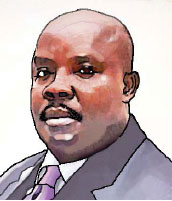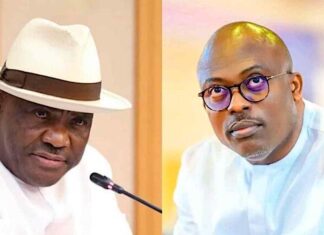Since a relation who lives in Monrovia, the capital of Liberia, sent me a picture of reconstruction work in the city, my mind has not ceased from running through the developments that brought the country to its current position.
Part of what I have done is to salute the efforts of men and women of goodwill, who have in various ways contributed in making the oldest independent West African country gradually resurrect from the ashes of its ugly recent past.
But while I commend these heroic efforts, I have also reflected on some of the actions that led the country to Golgotha, where it bled profusely in human and material resources. In that process, I recall the excitement that seized some of us, then in secondary school, on April 12, 1980, when Samuel Doe, a Master-Sergeant, took over the reins of power in Liberia through a military coup.
Our excitement, obviously borne of naivety, had nothing to do with the real situation in Liberia, which we had no firsthand knowledge of. It was rather in support of the coup that was then the fad in many African countries.
The reasons offered for the putsch and some of the actions by the new men in power also made us wish to be Liberians at that moment. The usurper regime had accused the civilian administration of William Tolbert, which it overthrew, of monumental corruption and holding down the future of the country.
And in what seemed the best of intentions, Doe and his men promptly embarked on what seemed a moral and economic rebirth in Liberia. Part of the actions in this regard was the arrest and retrieval of suspected looted state funds from officials of the ousted administration.
While Doe rode on the crest of this cleansing mission, he was lionised. With time, however, he was seized by sycophantic members of the ruling class. In the process, he got carried away and, over time, became more corrupt than the members of the Tolbert government that he booted out. To ensure that nobody pried into his activities, he resorted to repression, applying state apparatus to silence real and perceived opponents.
Liberians began to take notice of the massive drift by Doe when he started turning his sword against his former comrades-in-arm. The state of anarchy became more pronounced when, after changing the constitution to announce himself president in a highly-flawed election, Doe went after his close ally with whom he executed the 1980 coup, Gen. Thomas Quiwonkpa, in 1985, on allegation of attempting to take over the government by force. That and other self-righteous actions by the Commander-General, paved the way for the tortuous route Liberia is yet to recover from.
I cannot precisely explain why I have dwelt on this recollection in the last few days. But something, honestly, has been giving me a great deal of concern with the trend of things in our country, Nigeria, these days.
I can still recall the euphoria that pervaded our newsroom when some colleagues who voted in 2015 Presidential election came back and announced how virtually everybody they encountered claimed to have cast his/her vote for the then All Progressives Congress (APC) flag-bearer, Muhammadu Buhari.
Of course, the reasons for their action sounded cogent. The Peoples Democratic Party (PDP)-led administration that had ruled the country uninterruptedly, for 16 years, had proved to be a colossal failure. In place of good life which the founders of the party promised Nigerians at its formation in 1998, its successive officials in government offered misery to the citizenry. Corruption became the order of the day. Other vices followed.
When, therefore, Buhari triumphed over Goodluck Jonathan in the March 28, 2015 poll, the excitement was understandable. Just as Doe, the first indigenous Liberian from the Krahn ethnic stock dislodged the True Whig Party that had dominated the country’s politics since 1848, Buhari’s APC, the only opposition party to have dismantled a ruling party in Nigeria’s history, offered fresh hope to the citizens.
Ever since, the President and members of his administration have taken some salutary actions in tackling corruption and recovering looted funds, at least, as Nigerians were told. There have also been commendable acts of goodwill by the government in other sectors of the national life.
But the processes often adopted by the government and some of its agencies have rightly given Nigerians serious cause for concern. Aside non-adherence to valid orders on cases in the courts, the government is yet to convince critical observers that it is not selective in its anti-corruption agenda. It still remains a massive surprise, even to supporters of the administration, that the only known suspects that have been reined in are either members of the opposition or those not sharing the same views on issues with it.
With the court virtually comatose in the way the government has been trampling on its orders, the judicial arm of the government is steadily being rendered helpless. It is the same attitude at forceful appropriation of power that is seeing the executive making audacious incursion into the independence of the legislature. Presently, relations between the presidency and the National Assembly can at best be said to be lukewarm. If there is any disposition that the President has on the legislators for now, it is that of derision. There cannot, in that instance, be a shorter route to dictatorship.
For now, these antics may continue to excite those who still harbour disdain on officials of the previous administration. Some may even chorus that they deserve whatever that comes their way.
Maybe, they do. But the danger in celebrating the outcome of any exercise without a critical inquest into the process leading to it is that those who openly or tacitly applaud while it lasts often end up as victims. It is then that trampled interests begin to creep out of their shells.
That was what paved the rocky road to Monrovia. May it never be our fate.

- Advertisement -
- Advertisement -
Must Read
EXCLUSIVE: Wike gives Fubara conditions to avert impeachment
Wike gives Fubara conditions to avert impeachment
By Emma Ogbuehi
Minister of the Federal Capital Territory...










